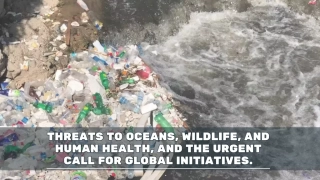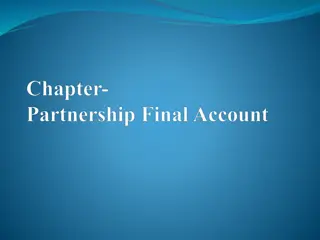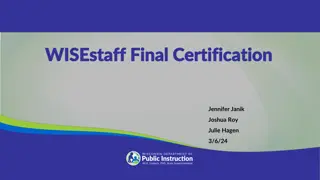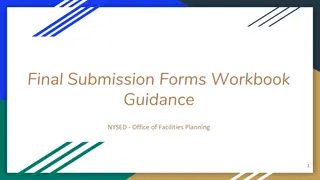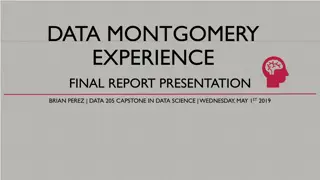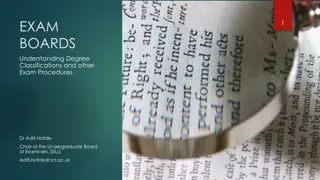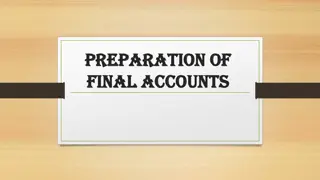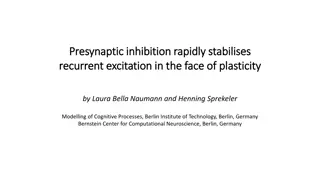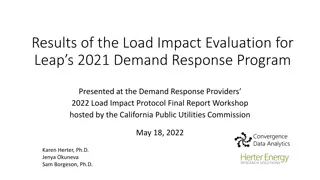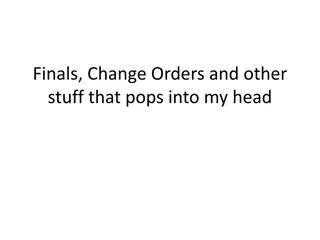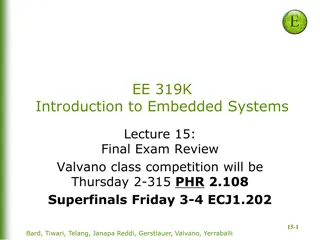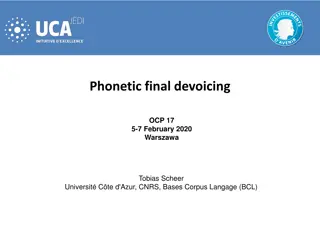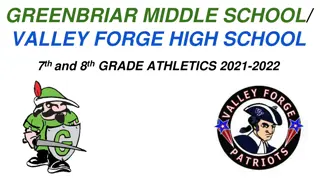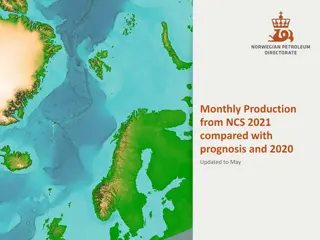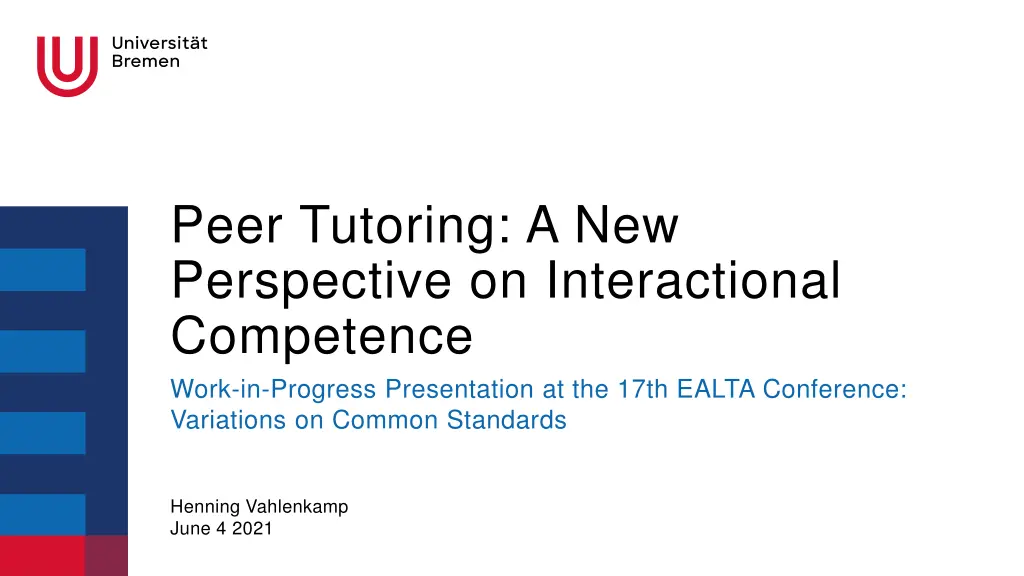
Peer Tutoring Program for Linguistic and Interactional Competence Development
Explore Henning Vahlenkamp's innovative peer tutoring program at the Language Centre of the Universities of Bremen, Germany, focusing on co-constructing learning pathways, negotiation of meaning, and individualized development of linguistic and interactional competence. Discover how social interactions and individual growth are cultivated through cooperative planning and optimizing language learning pathways.
Download Presentation

Please find below an Image/Link to download the presentation.
The content on the website is provided AS IS for your information and personal use only. It may not be sold, licensed, or shared on other websites without obtaining consent from the author. If you encounter any issues during the download, it is possible that the publisher has removed the file from their server.
You are allowed to download the files provided on this website for personal or commercial use, subject to the condition that they are used lawfully. All files are the property of their respective owners.
The content on the website is provided AS IS for your information and personal use only. It may not be sold, licensed, or shared on other websites without obtaining consent from the author.
E N D
Presentation Transcript
Peer Tutoring: A New Perspective on Interactional Competence Work-in-Progress Presentation at the 17th EALTA Conference: Variations on Common Standards Henning Vahlenkamp June 4 2021
Henning Vahlenkamp Tutoring Program at the Language Centre of the Universities of Bremen, Germany Professional learning advisory service Materials for independent study in 40 languages Peer assistance in planning and optimization of learning pathway Includes regular meetings (online/offline), documentation, final presentation
Henning Vahlenkamp Characteristics of the Program Co-construction of learning pathways through practices of co-operative planning and optimization (Jordan & Henderson 1995) Co-construction of meaning: Negotiation of meaning of language learning and tutoring (Jordan & Henderson 1995) Relevance of individual differences: linguistic and interactional competence, motivation, learning strategies, self-perception (Oxford 2017; Williamsen Hawkins 2018; Philp & Gurzynski Weiss 2020) Development of linguistic and interactional competence through individual practice and interaction in target language (Topping 1996; Mackey 2007; Hall & Doehler 2011)
Henning Vahlenkamp Henning Vahlenkamp Research Aims
Henning Vahlenkamp Research Complex A: Social Interaction Which interactions can be observed in the tutoring program? Co-constructed meaning in series of interaction: Negotiation of meaning (language learning and tutoring) and sequential flow of peer tutoring (Garfinkel 1967; Jordan & Henderson 1995) L2 interaction: Naturally-occuring interaction in target language (Mackey 2007; Kasper & Wagner 2011) Learning pathways: Co-operative planning and optimization of language learning pathways (Oxford 2017)
Henning Vahlenkamp Research Complex B: Individual Development How does the learner s interactional competence develop? How does the learner s motivation, learning strategies, and self- perception develop? Development of interactional competence: diversification, over time, of the L2 speakers techniques for interaction ( ) (Doehler & Pochon - Berger 2015) (Hall & Doehler 2011; Young 2019) Development of individual differences: learner s motivation, learning strategies, and self-perception (Williamsen Hawkins 2018; Philp & Gurzynski Weiss 2020)
Henning Vahlenkamp Synth se Research Complex A & B Individual development Interactional competence Social interaction Co-construction of meaning Reconstruction of interdependent processes of social interaction and individual development of interactional competence L2 interaction Co-operative planning Individual differences Individual differences (learner s motivation, learning strategies, and self-perception) as moderating influence factors
Henning Vahlenkamp Henning Vahlenkamp Research Design
Henning Vahlenkamp Exploratory qualitative design; longitudinal observation; judgement sampling Data collection (Spring/Summer 2020) Video recordings (meetings / final presentation) Reflective interview Learning biography & learning diary Data analysis Interaction analysis (Conversation analysis & ethnographic elements) Assessment of interactional competence by trained raters Content analysis
Henning Vahlenkamp Henning Vahlenkamp First Results
Henning Vahlenkamp Henning Vahlenkamp Sample: 6 learners / 2 tutors Observation: Predominant use of L1 language 4 learners used the target language only in final presentation 2 learners used the target language but both also dropped out of the program
Henning Vahlenkamp Social interaction Individual development Co-construction of meaning Interactional competence L2 interaction Individual differences Co-operative planning
Henning Vahlenkamp Lisa Clara (Learner) James (Learner) Carl (Learner) (Learner) Ahmed (Learner) Hannah (Learner) Fred (Tutor) Clara (Tutor)
Henning Vahlenkamp Clara (Learner & Tutor) Fred (Tutor)
Henning Vahlenkamp Learn how to tutor Informal training of peer tutors in independent language learning program Fred (Tutor) Clara (Learner/Tutor) experienced Interaction between experienced and unexperienced tutor? Co-construction of learning pathways Negotiation of meaning (learning and tutoring) unexperienced Application of acquired practice in tutoring (unexperienced tutor) Tutoring practice (experienced tutor) as a tutor as a tutor for tutoring What implications for the training of peer tutors arise out of the informal training practice?
Henning Vahlenkamp References Doehler, S.P. & Pochon-Berger, E. (2015). The development of L2 interactional competence: evidence from turn-taking organization, sequence organization, repair organization and preference organization. In T. Cadierno & S. Eskildsen (eds.) Usage based Perspectives on Second Language Learning (pp. 233 267). Berlin: Mouton De Gruyter. Garfinkel, H. (1967). Studies in Ethnomethodology. Prentice Hall, Englewood Cliffs/N.J. 1967. Hall, J.K. & Doehler, S.P. (2011). L2 Interactional Competence and Development. In J. K. Hall, J. Hellermann, J. & S.P. Doehler (eds.), L2 Interactional Competence and Development (pp. 206 243). Bristol: Multilingual Matters. Jordan, B. & Henderson, A. (1995). Interaction Analysis: Foundations and Practice. In The Journal of the Learning Sciences. 4, pp. 39- 103. Kasper, G. & Wagner, J. (2011). A conversation-analytic approach to second language acquisition. In D. Atkinson (ed.) Alternative approaches to second language acquisition (pp. 117-142). London: Routledge. Mackey, A. (2007). Interaction as practice. In R. DeKeyser (ed.) Practice in a Second Language: Perspectives from Applied Linguistics and Cognitive Psychology [Cambridge Applied Linguistics] (pp. 85-110). Cambridge: Cambridge University Press. Oxford, R. (2017). Teaching and Researching Language Learning Strategies. New York: Routledge. Philp, J. & Gurzynski - Weiss, L. (2020). On the role of the interlocutor in second language development. A cognitive interactionist approach. In L. Gurzynski - Weiss (ed.) Cross-theoretical explorations of interlocutors and their individual differences [Language Learning & Language Teaching 53] (pp. 19-50). Amsterdam, Netherlands: John Benjamins. Techno FAQ [Webside]. Tutoring (1 September 2017). Retrieved 28 May 2021 from https://technofaq.org/wp- content/uploads/2017/09/tutoring.jpg. Topping, K. J. (1996). Effective peer tutoring in further and higher education: A typology and review of the literature. In Higher Education 32, pp. 321 345. Williamson Hawkins, M. (2018). Self-directed learning as related to learning strategies, self-regulation, and autonomy in an English language program: A local application with global implications. In Studies in Second Language Learning and Teaching 8 (2), pp. 445 469. Young, R.F. (2019). Interactional Competence and L2 Pragmatics. In N. Taguchi (ed.), The Routledge handbook of second language acquisition and pragmatics (pp. 93-110). New York: Routledge.
Henning Vahlenkamp Thank you for your attention Contact: henning.vahlenkamp@uni-bremen.de Language Centre of the Universities of Bremen https://www.fremdsprachenzentrum-bremen.de Language Assessment @ Bremen https://www.lab.uni-bremen.de

